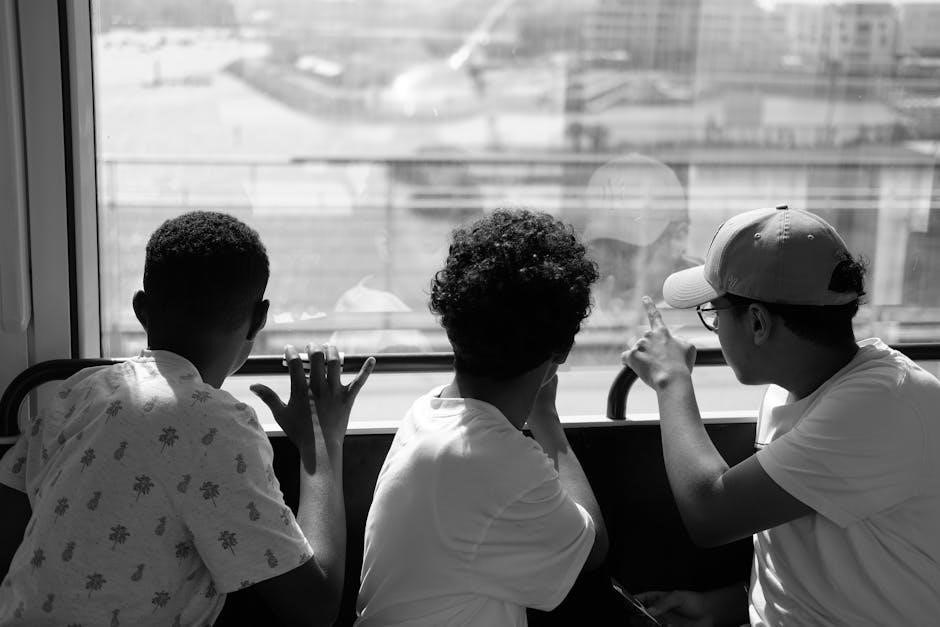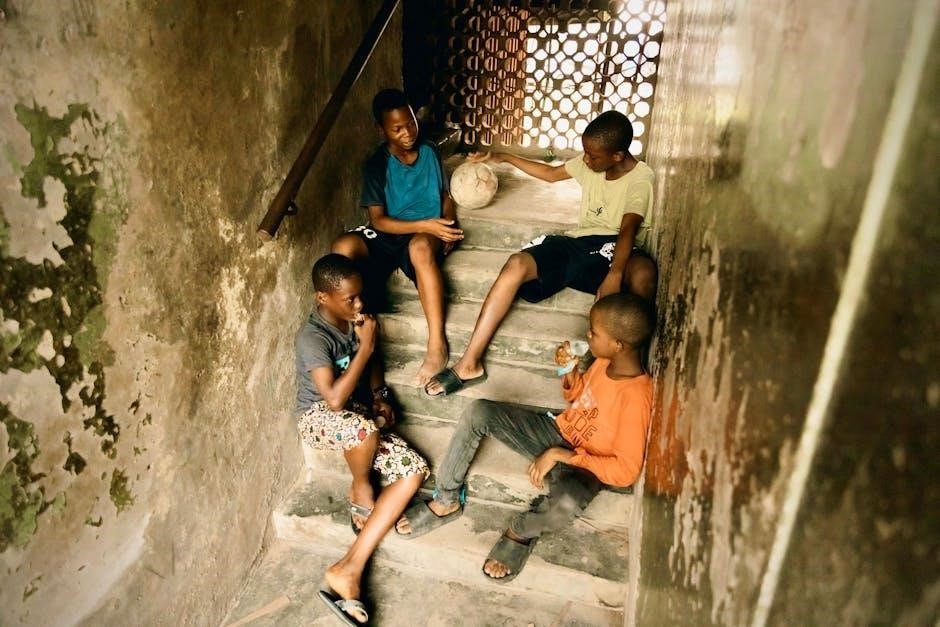master harold and the boys pdf

Athol Fugard’s masterpiece explores apartheid’s racial tensions through a poignant coming-of-age story‚ delving into themes of identity‚ morality‚ and redemption‚ set in 1950s South Africa․
Overview of the Play
Master Harold․․․ and the Boys is a poignant drama by Athol Fugard‚ set in 1950s South Africa during the apartheid era․ The story unfolds in a tea room owned by a white family‚ focusing on three characters: Hally‚ a privileged white teenager‚ and Sam and Willie‚ two black employees․ A rainy day sparks tension‚ revealing deep racial and personal conflicts․ The play explores themes of identity‚ morality‚ and redemption‚ drawing from Fugard’s own life experiences‚ making it a powerful commentary on apartheid’s emotional toll․
Historical Context: Apartheid-Era South Africa
Apartheid‚ a system of institutionalized racial segregation‚ dominated South Africa from 1948 to 1994․ During this period‚ the government enforced strict laws that discriminated against non-white populations‚ perpetuating inequality and violence․ Set in 1950‚ Master Harold․․․ and the Boys reflects the tensions of this era‚ capturing the societal norms that fueled racism and division․ The play vividly portrays how apartheid shaped relationships and daily life‚ emphasizing its profound impact on individuals and communities․

The Plot Summary

In 1950s South Africa‚ the play unfolds in St․ George’s Park Tea Room‚ where Hally‚ Sam‚ and Willie navigate a rainy day‚ leading to a poignant dance and Hally’s shocking outburst‚ revealing deep racial tensions․
Setting: St․ George’s Park Tea Room in 1950
The play is set in a modest tea room in Port Elizabeth‚ South Africa‚ during the early years of apartheid․ The single-room setting reflects the social hierarchy‚ with Hally’s family owning the establishment where Sam and Willie work․ The rainy day creates an intimate yet tense atmosphere‚ trapping the characters in a space that mirrors the societal confines of the time‚ highlighting both their relationships and the broader racial divisions․
Key Characters: Hally‚ Sam‚ and Willie
Hally‚ a privileged 17-year-old white boy‚ struggles with identity and familial tensions․ Sam‚ the older and wiser black waiter‚ serves as a father figure to Hally‚ offering guidance and moral clarity․ Willie‚ the younger black waiter‚ is more carefree but ambitious‚ striving to improve his life․ Their complex relationships‚ shaped by apartheid’s racial dynamics‚ drive the play’s emotional core‚ revealing both camaraderie and underlying tensions․
The Rainy Day Conflict
The rainy day in Port Elizabeth traps Hally‚ Sam‚ and Willie indoors‚ heightening underlying tensions․ Hally‚ burdened by his father’s return and family struggles‚ lashes out at Sam and Willie‚ revealing deep-seated racial and emotional conflicts․ This confrontation exposes the fragility of their relationships‚ as Hally’s anger and sense of superiority surface‚ starkly contrasting with Sam’s quiet wisdom and Willie’s hopeful optimism‚ unraveling the delicate bond they share․

Themes Explored in the Play
Racism‚ identity‚ and coming-of-age are central themes‚ exploring the emotional and societal struggles of apartheid-era South Africa through the complex relationships between Hally‚ Sam‚ and Willie․
Racism and Apartheid
The play vividly portrays the pervasive racism of apartheid-era South Africa‚ set in a humble tea room where racial hierarchies dominate․ It captures the emotional toll of institutionalized racism on relationships‚ particularly between Hally and Sam‚ reflecting the societal norms that enforce segregation and inequality․ Fugard’s personal experiences add depth‚ illustrating how systemic racism poisons even the most personal connections‚ leaving lasting scars on individuals and communities․

Coming of Age and Identity
The play explores Hally’s tumultuous journey of self-discovery‚ set against the backdrop of apartheid․ As a privileged white teenager‚ Hally grapples with his identity‚ torn between his loyalty to his family and his deep bond with Sam․ The story captures the fragility of adolescence‚ where societal expectations clash with personal morality․ Hally’s actions reveal the emotional turmoil of growing up in a world shaped by racial inequality‚ forcing him to confront his own prejudices and humanity․
Athol Fugard’s Personal Connection
Athol Fugard’s Master Harold and the Boys is deeply rooted in his own life‚ reflecting his complex relationships and the racial dynamics of apartheid-era South Africa․
Autobiographical Elements
Master Harold and the Boys is deeply personal‚ drawing from Athol Fugard’s own life․ The play reflects his complex relationship with two black men who shaped his youth‚ mirroring the dynamics between Hally‚ Sam‚ and Willie․ Set in 1950s South Africa‚ it captures the racial tensions Fugard witnessed and the moral dilemmas he faced‚ making it a profound exploration of guilt‚ redemption‚ and the lasting impact of apartheid on personal identity․
Fugard’s Journey to Atonement
Athol Fugard wrote Master Harold and the Boys as a form of personal redemption․ The play reflects his guilt over past interactions with black men‚ particularly those who shaped his youth․ By recounting these experiences‚ Fugard sought to confront his complicity in apartheid’s injustices․ The play became a cathartic exploration of race‚ privilege‚ and forgiveness‚ offering a poignant reflection on his journey toward moral accountability and reconciliation with his past․
Critical Reception and Impact
Master Harold and the Boys premiered on Broadway in 1982 to critical acclaim‚ running for 344 performances․ Despite being banned in South Africa‚ it gained global recognition․
Initial Success and Broadway Premiere
Master Harold and the Boys premiered on Broadway at the Lyceum Theatre on May 4‚ 1982‚ directed by Athol Fugard․ The production‚ featuring Danny Glover‚ Zakes Mokae‚ and Lonny Price‚ ran for 344 performances‚ earning critical acclaim and establishing Fugard as a major playwright․ This marked his first play to achieve such widespread recognition‚ solidifying its place as a powerful critique of apartheid and racial injustice․
Banned in South Africa‚ Acclaimed Globally
Despite its global acclaim‚ Master Harold and the Boys was banned in South Africa due to its scathing critique of apartheid․ The play’s honest portrayal of racial tensions and institutionalized racism resonated internationally‚ earning Fugard widespread recognition․ While it faced censorship in its homeland‚ its powerful message and emotional depth solidified its reputation as a groundbreaking work of literature‚ celebrated for its unflinching exploration of South Africa’s troubled history․
Stage Productions and Adaptations
Notable Performances and Casts
The Broadway premiere in 1982 featured Danny Glover as Willie‚ Zakes Mokae as Sam‚ and Lonny Price as Hally‚ earning critical acclaim․ Zakes Mokae received a Tony Award nomination for his powerful portrayal of Sam․ Later productions‚ such as Lucian Msamati’s performance at the National Theatre‚ showcased the play’s enduring appeal․ The 2013 production at the Fugard Studio Theatre in Cape Town further highlighted its cultural significance․
Revivals and Modern Interpretations
The play has seen numerous revivals‚ each bringing fresh perspectives to its timeless themes․ A 2013 production at the Fugard Studio Theatre in Cape Town highlighted its enduring relevance․ Modern interpretations often emphasize the universality of its exploration of race‚ identity‚ and human connection․ Directors continue to draw powerful performances‚ ensuring the play remains a poignant reflection of both historical and contemporary societal issues․
Educational Significance
This play is widely taught in schools‚ offering insights into apartheid’s impact and themes of identity․ Its rich narrative aids in critical analysis and reflection․
Teaching the Play in Schools
Schools worldwide integrate Master Harold and the Boys into curricula for its historical and emotional depth․ Educators use study guides to explore themes of racism‚ identity‚ and morality․ The play’s autobiographical elements and vivid characters like Hally‚ Sam‚ and Willie facilitate discussions on apartheid’s legacy․ Classroom analyses often focus on character development and the societal tensions portrayed‚ making it a valuable tool for fostering empathy and critical thinking among students․
Analysis and Study Guides
Detailed study guides and analyses of Master Harold and the Boys provide in-depth commentary on themes‚ characters‚ and historical context․ These resources explore Fugard’s portrayal of apartheid’s impact‚ highlighting the complex relationships between Hally‚ Sam‚ and Willie․ Guides often include discussion questions‚ critical perspectives‚ and historical insights‚ enabling readers to grasp the play’s emotional and societal significance․ They are invaluable for understanding the play’s layered meanings and its relevance to contemporary discussions on race and identity․
Legacy of the Play
Master Harold and the Boys remains a powerful critique of apartheid‚ influencing global discussions on race and identity‚ ensuring its enduring relevance in contemporary societal discourse․
Cultural and Social Impact
Master Harold and the Boys is a searing critique of apartheid‚ exposing its societal scars and challenging racial norms․ Its vivid portrayal of human relationships under oppression sparked global conversations about inequality and justice․ Fugard’s personal journey adds depth‚ making the play a powerful tool for reflection and change‚ resonating beyond South Africa to address universal themes of prejudice and redemption․
Enduring Relevance Today
Athol Fugard’s Master Harold and the Boys remains a timeless exploration of racial divides and human resilience․ Its themes of inequality‚ identity‚ and redemption continue to resonate in modern society‚ offering a mirror to systemic racism and social injustice․ The play’s universal appeal ensures its relevance in contemporary dialogues about prejudice and healing‚ making it a vital work for understanding both historical and present-day struggles․

Master Harold and the Boys is a powerful reflection of South Africa’s troubled past‚ offering enduring lessons on identity‚ race‚ and humanity‚ inspiring ongoing dialogue and change․

Final Thoughts on the Play’s Importance
Master Harold and the Boys remains a timeless exploration of race‚ identity‚ and humanity‚ offering universal lessons on morality and compassion․ Its unflinching portrayal of apartheid’s cruelty resonates deeply‚ while its emotional depth continues to challenge audiences․ As a semi-autobiographical work‚ it underscores the power of storytelling to confront past wounds and inspire change‚ cementing its place as a vital piece of theatrical and historical significance․
Call to Action for Further Exploration

Engage with Master Harold and the Boys by reading the play‚ watching performances‚ or exploring study guides․ Reflect on its themes of race‚ identity‚ and redemption․ Discuss its relevance with others‚ fostering dialogue about its historical and contemporary significance․ Consider analyzing its autobiographical elements and Fugard’s journey toward atonement․ Dive into its cultural impact and how it challenges societal norms‚ inspiring personal growth and empathy in audiences worldwide․



Leave a Reply
You must be logged in to post a comment.